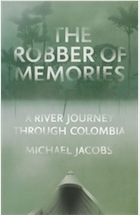The Robber of Memories
The Robber of Memories by Michael Jacobs, Granta, 2012.
Colombia’s Magdalena River could claim to be the second most important in South America after the Amazon. In some ways it’s more important, if a judgement hinges on the Spanish conquest and its aftermath, since the Magdalena allowed the invaders to reach the Andean regions where the Inca empire reached its northern limits and later great colonial cities like Bogota would be built. It offered access to the continent from Latin America’s northern coastline, readily accessible to the galleons crossing on the trade winds. The river was first penetrated by the Spanish in 1533, from the new Spanish colonial city of Cartagena, which still has its original colonial centre and fortified walls. The native tribes in the hinterland were, as ever, cruelly exploited, their gold treasures robbed and shipped back to Spain.
But the river’s role in linking the coast with the Andes also made it a cultural meeting point from which music like La Cumbia emerged, and which inspired many of Colombia’s writers, none more so than Gabriel Garcia Marquez. ‘Gabo’ could be said to have made his transition to adulthood on his first journey by riverboat on the Magdalena in 1943, sent by his father to find his fortune in the capital. Although the 15-year old cried until dawn on his first night aboard, the journey (in Jacobs’ words) was to provide a ‘treasure trove of future memories’. They were used to full effect in Love in the Time of Cholera, in which the love-sick hero spends a melancholy boat trip ignoring the civil war which is taking place and which has obliged the captain to prohibit the passengers’ favourite sport of taking pot shots at the caimans on the Magdalena’s banks.
Michael Jacobs joins the Catalina at Barranquilla, the port where the Magdalena enters the Caribbean. The first stage of the journey is so tortuous and the boat’s progress so erratic that after seven days he reckons he’s still only an hour’s drive from his starting point. In any event, the riverine journey comes to an end after more than 500 kilometres at Puerto Berrio, and Jacobs takes to buses to travel towards the river’s source. The flavour of the trip changes too, as Jacobs becomes immersed in places that are still suffering the violence of Colombia’s paramilitary conflicts.
But another strand of the book, about the predicament of his mother left in England who is suffering from the late stages of dementia, also develops further. Already, in Cartagena, Jacobs had two brief encounters with the legendary Garcia Marquez, himself in the early stages of the dementia that would soon result in his brother announcing the writer’s retirement. He had, nevertheless, given Jacobs some inspiring words about the Magdalena with which to begin his trip. Then, in Angostura, Jacobs makes an extraordinary visit to a village with a very high incidence of Alzheimer’s disease, where he talks to a world expert in the illness and meets a family in which four children have Alzheimer’s, their father having died of it.
The Magdalena has invariably played a part in Colombia’s many internal conflicts, notably ‘La Violencia’ of the 1940s and 1950s and more recent guerrilla wars and paramilitary violence, which still stutter on despite active peace negotiations. (I’ve written about a recent example of the continuing violence here.) Leaving Angostura to head further south towards the Magdalena’s source, Jacobs becomes increasingly worried about the prospect of meeting guerrilla groups, particularly the FARC, even though by the time of his journey they had largely given up kidnapping people.
Ascending on foot and horseback the mountain range that leads to the river’s source, Jacobs and his companion do indeed meet the FARC, are interrogated and released. Something similar happens on the return journey, where they are commissioned to translate from English an instruction sheet on how to use a rifle sight. This bizarre and no doubt very alarming incident lasted only a few hours, but there is a coda to it: two days later the army obliterated the guerrilla camp, and with it the young combatants with whom Jacobs had begun to empathise.
In turns out then that the ‘Robber of Memories’ has several meanings. Alzheimer’s is of course one. Then the river itself has been called an ‘illusion of memory’ by Garcia Marquez, whose own recollections of it are sadly now confined to his writings. Finally, so many people whom Jacobs meets have had their memories robbed – or rather, repressed – by the armed conflicts and their consequences. Many of his questions about it are met by blank looks, bland comments or by his respondents changing the subject. In the parts of Colombia through which the Magdalena runs, it will probably be several more years before this changes.
